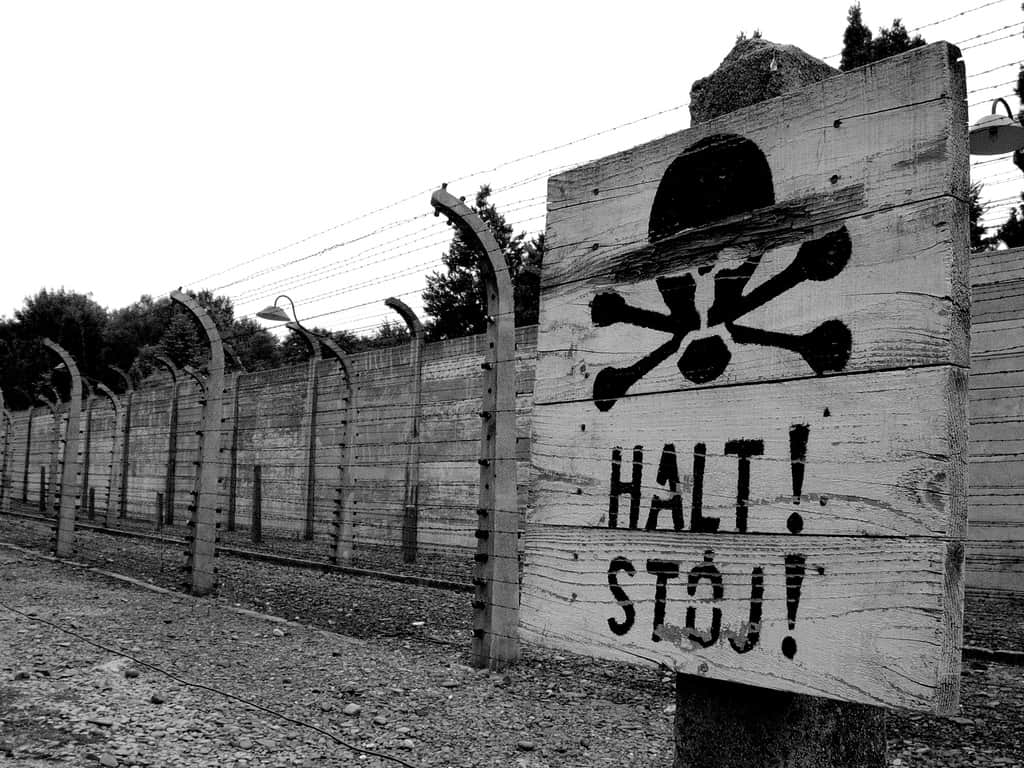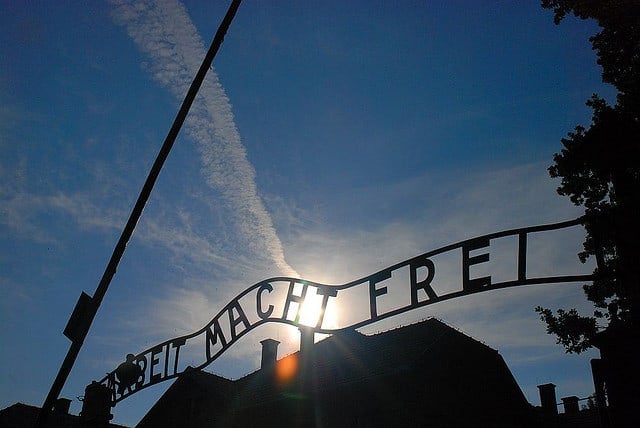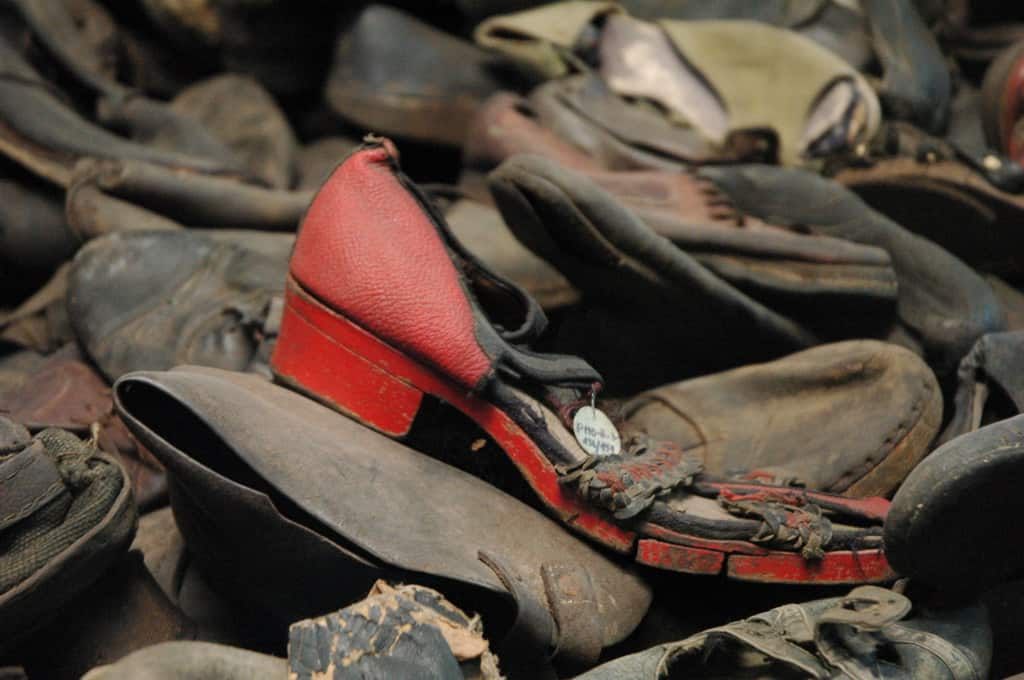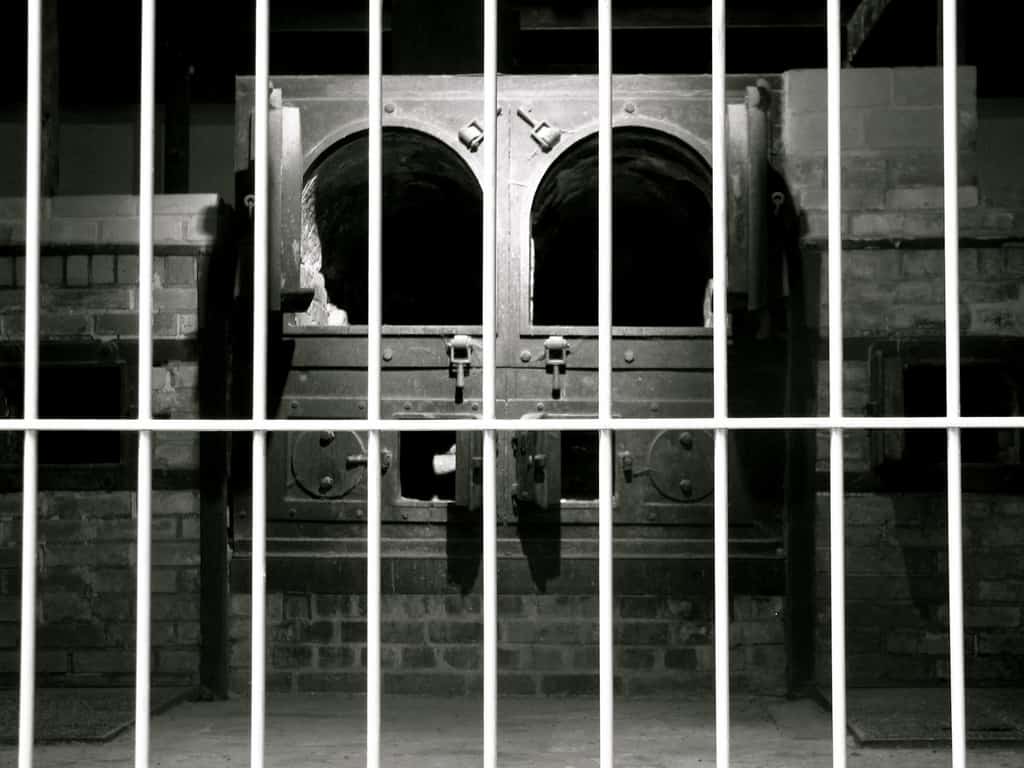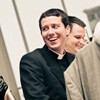I stumbled alongside the foundation of a building, my toes occasionally clipping a fallen brick and my mind tripping over just about everything else. I couldn’t quite figure out where I ought to look. The heavens might have seemed like a natural place, but here they are impossibly far away. The fields where the bodies were burned and the pond where the ashes were discarded drew my gaze, but looking for serenity feels like betrayal of the dead. So I looked at the bricks, most of them broken and half-buried, like the victims to whose death they once bore witness.
There isn’t a single gas chamber or crematorium whose walls weren’t blown up by the departing Nazis, but somehow they still cast long, dark shadows over all who walk by. See, I am wandering through one of the major sections of the Auschwitz concentration camp – the section named Auschwitz-Birkenau, a death camp for well over 1,000,000 human souls. The Auschwitz compound, large enough that the Germans displaced seven Polish villages to create it, may represent the 20th century more than any other place on earth. My hope is that it is not because of what occurred there in the early 1940’s. My hope is that Auschwitz stands in for the 20th century because of how we respond to what occurred amidst these bricks.
***
I was not alone during my days in Auschwitz. Thank God. I don’t know what I would have done without the dozen or so seminarians and medical students who stumbled through it with me.1 In the evenings, we made meaning of days spent at memorials and death camps. I am not saying we made sense of it – you can’t make sense out of something so senseless – but we tried to understand what it meant for our world and for our professions that the Holocaust had occurred. That it had tolled, like a bell humanity can’t un-ring.
We had been together for a week or so before arriving at Auschwitz. After that first day of clipping my toes on fallen bricks I shared in my small group that I felt slightly uneasy. Although we had quickly become very comfortable with one another, I felt as if I was walking around in someone else’s private space. I, a Roman Catholic seminarian, was walking around an essentially Jewish death camp alongside rabbinical students. And so I shared with my Jewish colleagues that because the Nazis had placed so much effort on exterminating the Jews, I felt, walking through Auschwitz, as if I was eavesdropping on a family tragedy.
Intellectually, I knew there was more to it. Of course the Nazis killed the disabled, and Roma, and homosexuals, and on and on. Of course their actions were not an offense against only Jews but an offense against humanity. Of course it is a reality that everyone, not just Jews, must be aware of. Of course. But just because we know something intellectually does not mean it fully penetrates our hearts. It wasn’t until later that the two became more aligned.
***
Maximilian Kolbe, O.F.M. Conv. was imprisoned by the Gestapo for hiding Jews in his friary and was transferred to Auschwitz-I on 28 May 1941. In July, three men escaped the camp and, as a matter of common practice, the commander of the camp chose 10 men to execute in order to deter further attempts. When one of the men chosen cried out “My wife! My children!”, Kolbe offered his own life in place of the man’s. So Kolbe was set with the other nine to the starvation chamber.
I don’t want to pass over this too quickly. He was sent to starve to death. They wouldn’t waste bullets on him. They wouldn’t waste poisonous gas. They would just let neglect take its toll. Neglect does that, you know. It doesn’t seem like much as first, just a simple passing over. But eventually the depths of neglect twist reality beyond recognition. And that’s what the Nazis did so well. Sure, they were active in their hatred. But it was their unwavering neglect of people’s humanity that made it all possible.
After the other nine had starved to death, Kolbe was still on his knees praying. His refusal to die on their timeline upset the commanders so much that they injected him with carbolic acid, a favorite of the Nazi euthanasia program. He died on 14 August 1941 and was canonized on 10 October 1982. And I prayed in front of his starvation cell on 25 June 2012.
And, strange as it may seem, my prayer was one of joy.
***
In March 2003 I prayed in the chapel where Archbishop Oscar Romero – considered by many to be a martyr of charity as was St. Maximilian Kolbe – was assassinated on 24 March 1980. He was one of 70,000 people killed in the 1980’s during El Salvador’s civil war, most of whom were poor. As Archbishop he experienced the murder of a good friend, Fr. Rutilio Grande, S.J., and of many other priests in his diocese. I remember him here because it was one of his homilies that I recalled as I prayed in the evening about my day spent at Auschwitz-I, and in the starvation cell of St. Kolbe.
Romero wrote:
I rejoice, brothers and sisters, that they have murdered priests in this country. … For it would be very sad if in a country where so many Salvadorans are murdered, the church could not also count priests among the murdered ones. … It is a sign that the church has become incarnate in poverty. … A church that does not suffer persecution, that church should be fearful. It is not the true church of Jesus.
These words surfaced many things for me, two of which I would like to share here. First, it helped me make sense of my discomfort, the discomfort of too quickly assuming familiarity with the tender soil of Auschwitz. Second, it helped me see more clearly how this trip, this exploration of the past, ought to inform my future.
***
Although Kolbe is the most well known victim, the Nazis killed thousands of Catholic priests, and hundreds of thousands of Catholics. But their elimination was not systematic in the way Jewish elimination was. Many of them were killed not because they were Catholic, but because they were Polish or a member of some other “inferior” group, ethnic or otherwise.2 Regardless of the terrible number of deaths, the uncomfortable feeling that I was trespassing on another family’s suffering remained.
I believe my discomfort came, most deeply, from the fact that there are so few examples of Catholic bishops or priests who died at the hands of the Nazis because of the courage of their convictions. How many died or were persecuted because their faith compelled them to act in way that challenged the neglect of another’s humanity? St. Kolbe is one. Blessed Bernhard Lichtenberg is another, but to me it seems that the list is short. Shockingly short.
This is why my prayer at Kolbe’s cell was a prayer of rejoicing. I, like Romero, was filled with joy that a priest was a murdered because it was a sign that a leader in the Church “had become incarnate in poverty.” Someone realized that the true church of Jesus does not have stand aside as others are persecuted. No, we should not seek death for the sake of death nor persecution for the sake of persecution, but we ought to know by now that the Gospel demands more from us than the world is willing to allow us to give. And we ought to celebrate, to rejoice, when one amongst us gives this more never the less.
***
It is never as clear in the moment as it is 10, 20, 70 years later, at least not to most of us. I’d like to think I would have been as brave as Lichtenberg or Kolbe, but more likely I would have been one of the priests attempting to justify why such a radical position was unnecessary.
… I’m much better at change from within, so I’ll bide some time.
… If we challenge the way things are too much it’ll just get worse.
… One person really can’t make a difference in such a big system.
But you can play it safe in two directions. You can create excuses not to act, but you can also preach to the proverbial choir. I dare to say: if you are mainly getting affirmation for your work then you are probably speaking to the people who don’t need to hear you. The convictions of our faith do not grow in echo chambers. They only have a chance of helping build something greater if they are brought out to face their challengers. Sometimes those challengers will be fierce. Often it will be easier not to say or do anything.
There is a cost to living the Gospel. But if that cost is rooted in prayerful consideration of how best to love God and love neighbor, I have faith that the story will not end with one’s suffering. Kolbe’s didn’t. Romero’s didn’t. Neither of their deaths stopped the wars raging in their countries, but that’s not what God asks of us. God only asks that we do what we can – as inadequate as that may be in the face of great evil – and leave the rest to God.
Joy is not the only emotion I felt at the grave of a murdered priest. I felt anger and shame and sadness during the entire trip, especially at Auschwitz. And these were the more natural, the justifiable emotions. And yes, they had their time and their place and I needed to feel them and not to run. But they were not going to sustain me. It is joy that allowed me to return to Auschwitz the following day.
Isn’t that how it is with the rest of our lives? When I confront the health-related challenges of immigrants, the disabled, or the global poor it is hard not to feel some level of anger or fear or sadness. Think, just now, of something you truly care about, and feel, for an uncensored moment, the roil of emotions that bubble up. Feel the twisting stab of sadness or absence. Feel the lead weight of uncertainty or disbelief. But also feel the leap of joy. Without dismissing any of these others, dwell for a while in the joy; trust that the smallest light can battle even the darkest places.
***
I still don’t know where I should have been looking as I walked through the remains of the crematorium that first day. Ultimately it didn’t matter where my gaze fell because I needed to be looking at myself. I needed to see what is possible when I, when my Church, are courageous, when we do not fear persecution. It may lead to counting cleric and lay alike amongst the murdered. It’s because of these that those who come after us, those who walk through the ruins of our history, won’t have to look very far to find joy in a life of faith.
— — — — —
- We were recipients of the Fellowship at Auschwitz for the Study of Professional Ethics sponsored by the Museum of Jewish Heritage, a shared experience none of us will soon forget. ↩
- Although it is a worthy topic for many scholars, this is not the forum to consider the Catholic Church’s institutional response to the Holocaust. I hope readers can tell this reflection is at a more personal level. ↩

